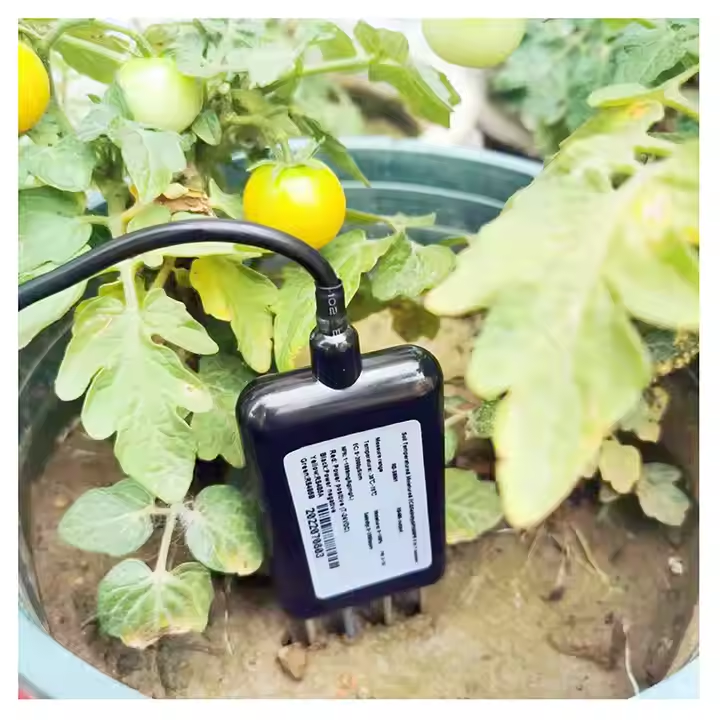Ngenxa yokwanda kwengqwalasela kwihlabathi liphela kwezolimo ezizinzileyo kunye nezolimo ezichanekileyo, indima yetekhnoloji kwimveliso yezolimo iye yabaluleka ngakumbi. EColombia, ilizwe elihle neliphilayo, abalimi bajongene nemingeni emininzi efana nokwandisa isivuno sezityalo, ukuphucula ulawulo lwemithombo yamanzi kunye nokujongana notshintsho lwemozulu. Ngokuchasene nale meko, izinzwa zomhlaba, njengetekhnoloji entsha, ngokuthe ngcembe ziba sisixhobo esibalulekileyo sokuphucula ukusebenza kakuhle kwezolimo. Eli nqaku liza kuhlola iimpawu kunye neenzuzo zezinzwa zomhlaba, kunye nendlela yokukhuthaza nokusebenzisa obu buchwepheshe kwimisebenzi yezolimo eColombia.
Yintoni inzwa yomhlaba?
Isixhobo sokuhlola umhlaba sisixhobo esisetyenziselwa ukujonga imeko yomhlaba, esikwaziyo ukuqokelela idatha yexesha langempela efana nokufuma komhlaba, ubushushu, ixabiso le-pH kunye nomxholo wezondlo. Ezi sensor zidlulisela idatha kumaqonga efu okanye kwizixhobo eziphathwayo ngeenethiwekhi ezingenazingcingo, zivumela abalimi ukuba bajonge imeko yomhlaba nanini na naphi na, baze ngaloo ndlela benze ukuchumisa nokunkcenkceshela ngokuchanekileyo.
2. Iingenelo zeenzwa zomhlaba
Ukuphucula ukusebenza kakuhle kokusetyenziswa kwemithombo yamanzi
IColombia lilizwe elinobutyebi bamanzi obuninzi, kodwa kwezinye iindawo, ulawulo lwemithombo yamanzi lusengumngeni. Izixhobo zokuhlola umhlaba zinokujonga ukufuma komhlaba ngexesha langempela, zincede abalimi bamisele ixesha elifanelekileyo lokunkcenkceshela, banciphise inkunkuma yamanzi kwaye baphucule ukusebenza kakuhle kokunkcenkceshela.
Ukuchumisa ngokuchanekileyo
Ngokuvavanya umxholo wezondlo emhlabeni, abalimi banokwenza izicwangciso zesayensi zokuchumisa ngokusekelwe kwiimfuno zokwenyani zezityalo zabo. Oku akunakunyusa kuphela isivuno kunye nomgangatho wezityalo kunye nokunciphisa ukusetyenziswa kwezichumisi, kodwa kunciphise nempembelelo embi kwindalo esingqongileyo.
Ukubeka iliso kwedatha ngexesha langempela
Izinzwa zomhlaba zibonelela ngedatha yexesha langempela, zinceda abalimi baqonde iimeko zomhlaba ngexesha elifanelekileyo kwaye baphendule ngokukhawuleza. Oku kubaluleke kakhulu ekusombululeni imiba efana notshintsho lwemozulu kunye nolawulo lwezinambuzane nezifo.
Nciphisa iindleko zemveliso
Ngokulawula ngokuchanekileyo amanzi kunye nezondlo, abalimi banokunciphisa kakhulu iindleko zemveliso kwaye baphucule iingenelo zoqoqosho. Ukuba negalelo elincinci kwizixhobo, imveliso ephezulu inokufezekiswa, nto leyo ibalulekileyo ekuphuculeni ingeniso yabalimi.
Ukukhuthaza uphuhliso lwezolimo oluzinzileyo
Ukusetyenziswa kwezinzwa zomhlaba kunceda ekufezekiseni iinjongo zophuhliso oluzinzileyo lwezolimo. Ngokusebenzisa izixhobo ngempumelelo ngakumbi nokukhusela imithombo yomhlaba namanzi, abalimi abanakuphucula kuphela ukusebenza kakuhle kwemveliso kodwa banokwenza negalelo elihle ekukhuselweni kokusingqongileyo.
3. Isiphelo
EColombia, ukusetyenziswa kwezinzwa zomhlaba kubonelele ngamathuba amatsha ophuhliso lwezolimo. Ngokusebenzisa amaqhinga okukhuthaza afanelekileyo kunye namanyathelo emfundo, singabanceda abalimi ukuba bamkele obu buchwepheshe butsha, ngaloo ndlela baphucule ukusebenza kakuhle kwemveliso yezolimo kwaye bakhuthaze uphuhliso oluzinzileyo. Kwixesha elizayo, ngokusasazwa kwezinzwa zomhlaba, ezolimo eColombia ziya kuba nobuchule ngakumbi kwaye ubomi babalimi buya kuba nempumelelo ngakumbi. Masibambane ngezandla kwaye sisebenzisane ukukhuthaza ukuphuculwa kwezolimo, kwaye isayensi kunye netekhnoloji zizise amandla amatsha kunye nethemba emhlabeni!
Ukuze ufumane ulwazi oluthe kratya ngezixhobo zokuhlola umhlaba, nceda unxibelelane neHonde Technology Co., LTD.
Umnxeba: +86-15210548582
Email: info@hondetech.com
Iwebhusayithi yenkampani:www.hondetechco.com
Ixesha leposi: Meyi-27-2025


